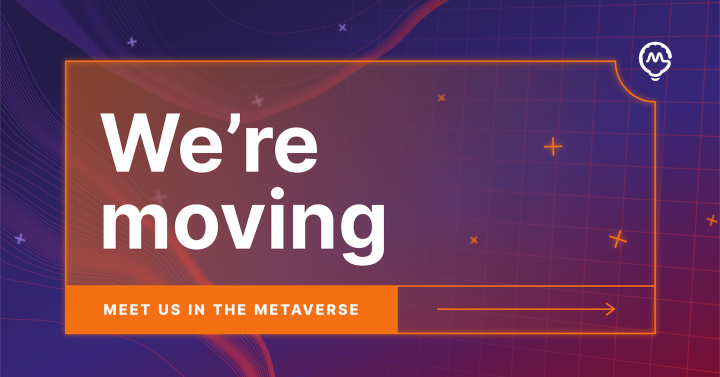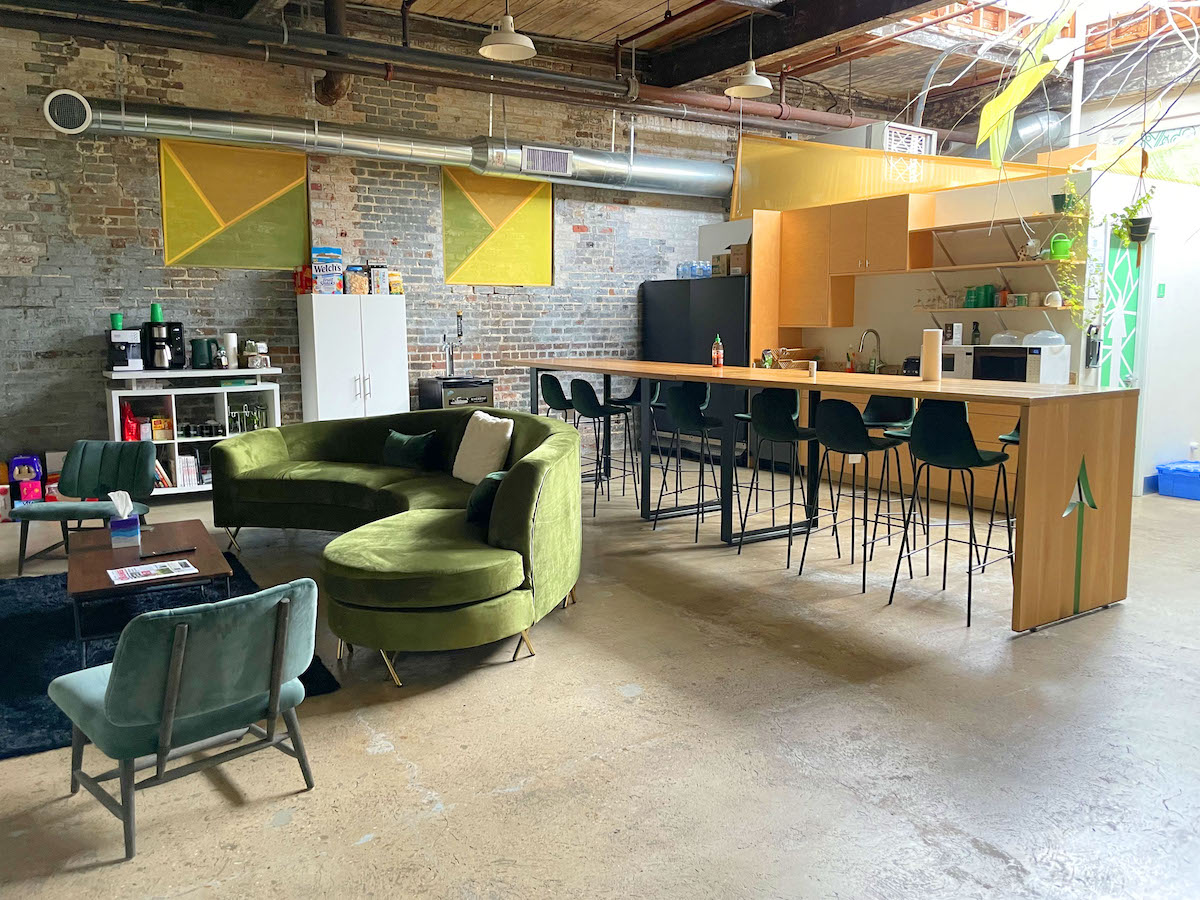NFTs, Web3 and metaverse — these are the three words that seem to drive tech Twitter these days. And the biggest questions about the latter: “What is the metaverse?” and “Do I need to have a business presence in it?”
With companies such as Baltimore’s Mindgrub moving its headquarters to the metaverse and big players pouring millions of dollars into its development, business owners are hungry to understand how to approach this phenomenon.
In my role as senior director of design innovation at Online Optimism, with offices in New Orleans, Atlanta and DC, one of my responsibilities is to explore new technologies to keep our agency and staff on the leading edge. For the past couple of weeks, I have been busy building a replica of our New Orleans headquarters in Meta’s Horizon Worlds. As a skeptical early adopter, I’d like to describe the good, the bad and the ugly of the metaverse.
But first, let’s define the metaverse — or at least try to.
From ‘The Matrix’ to the metaverse
First coined in 1992 by sci-fi writer Neal Stephenson in his novel “Snow Crash,” the metaverse is simply a 3D virtual space. But I wouldn’t regard Stephenson as the creator of the metaverse. Dozens of movies and books such as “The Matrix,” “Ready Player One” and even “Wreck-It Ralph” (for Pixar fans out there) have envisioned a world that’s not bound by physics and is powered by the almighty cyberspace.
So now that we have fiction out of the way, let’s try to make sense of the current state of the actual metaverse.
There’s no single answer to that, though. For now, it’s just an umbrella term for a disjointed group of virtual experiences that are under development by tech giants you probably know and metaverse-first companies that hope to decentralize its development.

Baltimore’s Mindgrub made this announcement in January 2021. (Image courtesy of Mindgrub)
Building with Horizon
Meta (formerly Facebook), for example, hosts its metaverse via its Horizon family of apps, which are accessible through its Meta Quest virtual reality headset. Horizon Worlds, its flagship game, lets you create worlds, explore them, attend events, and interact with other people (spoiler alert: it’s awkward). In my experience building our office headquarters in Horizon Worlds, the barrier for entry for designers is rather low, but not without some caveats and limitations.
Unlike other platforms where you can hire architects and game designers to build out your experience, Horizon Worlds allows you to build using basic shapes to create anything — from a couch to a coffee shop. More advanced users can create games and interactive experiences through scripting. However, you must do everything with your headset and remotes, which takes some time to get used to. Additionally, many things that would seem basic, such as adding images or controlling the transparency of objects, aren’t fully possible yet.
Horizon Workrooms, on the other hand, allows you to work in the metaverse and host meetings. You can connect your computer to your headset and use it in a Workroom, which you can even customize with your own logo. So prepare to start seeing folks out there wearing a headset while typing away on their laptops.

Online Optimism’s office in Horizon Workrooms. (Courtesy image)
Other big players in the space
Other giants like Microsoft are developing their own take — seemingly as a gaming-centered metaverse. For gamers, the social and real-time experience of playing games like Microsoft’s Halo and Activision Blizzard’s Call of Duty has been a reality for a while. Similarly, Roblox and Epic Games’ Fortnite have spent years garnering millions of users who play and interact in their own metaverse-like platforms. So it’s no surprise that through acquiring Activision Blizzard, Microsoft will continue to capitalize on users who are already used to a connected gaming experience to gain a foothold in the metaverse.
And not-so-small player Decenterland — a blockchain-based metaverse where users can purchase and develop virtual land — is gaining traction as a place where companies can design and run brand activations. Just days before the Super Bowl, NFL sponsor Anheuser-Busch cut the virtual ribbon on Miller Lite’s Meta Lite Bar in Decenterland, where users were invited for a chance to win $500.
Meanwhile, McDonald’s is also said to be prepping its virtual grills for a metaverse-based restaurant, and even Panera has filed a trademark for a “Paneraverse.”
In the metaverse, your avatar, the clothes it wears and the things it carries belong to you, thanks to blockchain. (Duncan Rawlinson — Duncan.co/Flickr, CC BY-NC)
So, do I need to open a restaurant or office in the metaverse?
No — at least not yet. The infrastructure behind the metaverse is still in its early days and is mostly at the hands of corporations that are betting on profitability within the next decade, but are still figuring out how to do it.
There are also many concerns around the privacy and safety of users. Within Horizon Worlds, not only is it easy to record other individuals, but Meta moderators have the ability to remotely observe and record you if they suspect a violation of their terms. Additionally, ongoing cases of unwanted interactions within Horizon Worlds prompted Meta to introduce a personal boundary within Horizon Worlds.
Paired with concerns over Meta’s targeted advertising and moderation practices, this may be one of the ultimate deterrents in building a significant user base within the platform (not to mention the $300 price tag on their Quest 2 headset). Before the metaverse turns a profit, I would anticipate regulatory conversations around its development and mountains of litigation. After all, when you’re within Horizon Worlds or any other metaverse experience, you’re bound by their community standards and terms of service — not the laws in your jurisdiction.
On the flip side, the early nature of metaverse experiences can feel like the domain gold rush of the ‘90s, as our CEO Flynn Zaiger put it, or even the crypto madness of the past couple of years. It is estimated that the metaverse could be an $82 billion industry by 2025, and JPMorgan is betting on a $1 trillion yearly opportunity, as it opens a branch of their blockchain arm in Decenterland. So investing time and tools into building the metaverse could give you a big advantage as the infrastructure improves and the user base grows. For smaller businesses, it could represent an entryway to consumers who have already traded the real world for the virtual world, such as the 43.2 million people who play Roblox every day.

Online Optimism’s NOLA office. (Courtesy photo)
Into the metaverse?
We don’t have plans of using Online Optimism’s metaverse headquarters as a replacement to our offices or work-from-home setups. Our bet in building them is merely aimed at providing future employees a fun opportunity to get a sense of our culture and creativity, while developing new internal capabilities for the future. We hope it pays off.
If you or your business are not ready to jump into the metaverse, you may want to keep an eye on it and stay informed. For the millions of people who search “metaverse,” “Web3” and “NFTs,” your early experience and knowledge could give you a competitive edge in the new age of the internet.

This guest post is a part of What Local Means Now Month of Technical.ly's 2022 editorial calendar.
Before you go...
Please consider supporting Technical.ly to keep our independent journalism strong. Unlike most business-focused media outlets, we don’t have a paywall. Instead, we count on your personal and organizational support.
3 ways to support our work:- Contribute to the Journalism Fund. Charitable giving ensures our information remains free and accessible for residents to discover workforce programs and entrepreneurship pathways. This includes philanthropic grants and individual tax-deductible donations from readers like you.
- Use our Preferred Partners. Our directory of vetted providers offers high-quality recommendations for services our readers need, and each referral supports our journalism.
- Use our services. If you need entrepreneurs and tech leaders to buy your services, are seeking technologists to hire or want more professionals to know about your ecosystem, Technical.ly has the biggest and most engaged audience in the mid-Atlantic. We help companies tell their stories and answer big questions to meet and serve our community.
Join our growing Slack community
Join 5,000 tech professionals and entrepreneurs in our community Slack today!

The person charged in the UnitedHealthcare CEO shooting had a ton of tech connections

From rejection to innovation: How I built a tool to beat AI hiring algorithms at their own game

Where are the country’s most vibrant tech and startup communities?



